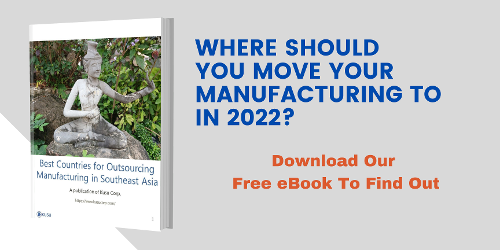Technological advancement in the past several decades has accelerated considerably and the rate at...
The Coup In Myanmar One Year Later
About a year has passed since the military took control of Myanmar. The military has played a significant role in Myanmar politics, having held power for many decades following independence.
In today’s article, we will be discussing what has happened since the coup, the impact of the coup, and the road ahead.
-1.png?width=600&name=Untitled%20design%20(2)-1.png)
What Has Happened Since the Coup
The Myanmar military, the Tatmadaw, launched a coup on the 1st of February of 2021, months after losing general elections to then de-facto civilian leader Aung San Suu Kyi’s party the National League for Democracy. Suu Kyi has since been arrested for alleged COVID-19 restriction violations, voter fraud, and corruption, according to France 24. She faces the prospect of being jailed for decades.
Moreover, mass unrest, protest, and possibly civil war have taken place in Myanmar following the coup. Anti-military protests quickly became violent when security forces began using live ammunition against protestors. As a result, according to Al-Jazeera, nearly 1,500 people have been killed and 11,500 arrested.
It is unclear if these numbers include those who have died fighting as part of civilian militias known as People’s Defence Forces or “ethnic armed groups” such as the Kachin Independence Army. Ethnic armed groups have been in continued conflict with the military for years.
Since then ASEAN has implemented a five-point consensus as its first major response to the coup. According to the University of Melbourne, points include: “an immediate cessation of violence in Myanmar, constructive dialogue among all parties, the appointment of a special ASEAN envoy to facilitate dialogue, the provision of humanitarian assistance, and a visit by the envoy to Myanmar.”
Impact of the Coup
However, the coup has shone a spotlight on the limitations of “the ASEAN Way.” Prior to the publication of the five-point consensus, ASEAN Member States were deeply divided on how to respond. This is especially true amongst more moderate countries such as Singapore, Indonesia, and Malaysia, and authoritarian countries such as Thailand, Vietnam, and Cambodia.
The latter three prefer to adhere strictly to ASEAN’s principle of non-interference. The international community is similarly divided. According to the BBC, amidst the possibility of civil war, the US, UK and European Union have imposed sanctions on military officials.
On the other hand, China vetoed a UN Security Council statement condemning the coup, though, to be fair, it has since called for a return to democratic norms. While China prefers to handle the matter bilaterally, both camps of countries still prioritise ASEAN diplomatic efforts in resolving the crisis.
Moreover, “COVID-19 and the coup has devastated Myanmar’s economy, with millions of people losing their jobs or sources of livelihood over the last year… the national currency… has plummeted in value, pushing up the cost of imports including cooking oil, agricultural inputs such as fertiliser, and refined fuels” writes International Crisis Group. As a result, “An estimated 46% of people in Myanmar could now be living below the poverty line,” reports the Guardian.
The Road Ahead
Previously known for incredibly slow changes and development, ASEAN agreed to the five point consensus and thereafter banned General Min Aung Hlaing from attending ASEAN summits and meetings. The latter is an unprecedented development in an organisation based around unanimous consensus. According to Al-Jazeera, it has also appointed a special envoy to monitor and lead discussions surrounding the Myanmar crisis.
However, ASEAN responses are beginning to fracture once again. The five point consensus continues to be violated by Myanmar, according to the Bangkok Post. Current ASEAN Chair, Cambodia, also has a former General who enacted mass crackdowns on opposition parties as its national leader. Al-Jazeera reports the Cambodian Prime Minister has even held a state visit without prior consultation with ASEAN countries, an act many view as legitimising the Myanmar junta.
Reuters reports Cambodia may even allow Hlaing to attend meetings again. Additionally, “A visit to Myanmar by ASEAN Special Envoy Erywan Yusof was cancelled after the junta would not allow him to visit the detained leader Aung San Suu Kyi,” writes the Conversation. Nonetheless, Singapore, Indonesia, and Malaysia have remained resolute in their condemnation of the Myanmar junta. In a January ASEAN Foreign Ministers Meeting, Indonesia called on the special envoy to meet all parties.
Malaysia has similarly called for meetings with the ousted civilian government, wrote Reuters. The SCMP reports these countries were likely instrumental in delaying the January foreign ministers meeting following Cambodia’s visit, even being able to secure support in banning the Myanmar Junta’s top diplomat. In the future, it is likely these countries will continue their efforts. However, it nonetheless remains to be seen what ASEAN will do thereafter and how the situation will be resolved.
The situation in Myanmar continues on a year after. The country is nearing economic collapse as unrest and fighting ranges on across the country. ASEAN has since stepped up its responses but it remains somewhat fragile.
We here at Kusu continue to monitor any and all political developments to offer you and your company a more comprehensive understanding of Southeast Asia.
-1.jpg?width=146&height=50&name=Kusu%20(1)-1.jpg)




